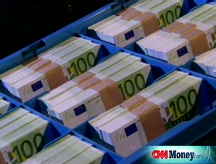Dollar falls on weak economic reports
Greenback retreats after a worse-than-expected GDP report and a jump in unemployment claims.
NEW YORK (CNNMoney.com) -- The dollar lost ground against major currencies Thursday, after a report showed the economy grew less that expected over the past several months, and jobless claims reached the highest levels since 2003.
The euro traded at $1.5598, up from $1.5574 the night before in New York trading. The dollar also fell to ¥107.84, down from ¥108.04 a day earlier.
GDP: The U.S. Commerce Department said the gross domestic product rose at an annual rate of 1.9% through the second quarter, a significant jump over the first quarter, but less than predicted. Analysts polled by Briefing.com had expected an increase of 2.3%.
The government also revised economic growth through the last three months of 2007 downward, showing the economy retracted by a 0.2% annual rate during the period.
"I think that over the past few weeks, some traders got euphoric, thinking the economy is going to turn around," said Kevin Chau, foreign-exchange analyst with IDEAGlobal in New York.
The dollar had been gaining strength over the past several weeks, as the stock market trended upward and oil prices fell on fears that high fuel prices had seriously damaged demand. However, the lower GDP number sent optimistic traders reeling, according to Chau.
Unemployment: Additionally, a report from the U.S. Labor Department said that new filings for jobless benefits rose 44,000 to 448,000 last week, the highest level since claims hit 450,000 the week of April 19, 2003.
Analysts had only expected a rise of 8,000. The government said much of the jump resulted from a special outreach program telling citizens they could receive an additional 13 weeks of unemployment benefits due to a bill Congress passed in June.
"The combination [GDP and unemployment] today wasn't great for the dollar. Fewer jobs, less income, less spending by consumers," said Nick Bennenbroek, chief currency strategist for Wells Fargo. "It's just not great for the economy."
European inflation: Eurostat, the European Union's office of statistics, reported that inflation in the euro-zone reached 4.1% in July, its highest point since record keeping began in 1996.
The report prompted some speculation that the European Central Bank may be forced to raise interest rates. The ECB raised its key interest rate earlier this month, to 4.25% from 4%, in an attempt to mitigate mounting inflation.
"Given where energy prices have been, it's not surprising to see inflation increasing," said Stephen Malyon, currency strategist at Scotia Capital in Toronto.
Though the European futures markets are signaling the possibility of a rate hike, "most people think the ECB will remain on hold," Malyon added. ![]()


